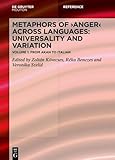Metaphors of ANGER across Languages : Universality and Variation. 8.1, Metaphors of ANGER across Languages: Universality and Variation ; Volume 1: From Akan to Italian / ed. by Zoltan Kövecses, Réka Benczes, Veronika Szelid.
Material type: TextSeries: Comparative Handbooks of Linguistics [CHL] ; 8.1Publisher: Berlin ; Boston : De Gruyter Mouton, [2024]Copyright date: 2025Description: 1 online resource (XII, 738 p.)Content type:
TextSeries: Comparative Handbooks of Linguistics [CHL] ; 8.1Publisher: Berlin ; Boston : De Gruyter Mouton, [2024]Copyright date: 2025Description: 1 online resource (XII, 738 p.)Content type: - 9783110735499
- 9783110731071
- 9783110730999
- 410.1
- online - DeGruyter
- Issued also in print.
| Item type | Current library | Call number | URL | Status | Notes | Barcode | |
|---|---|---|---|---|---|---|---|
 eBook
eBook
|
Biblioteca "Angelicum" Pont. Univ. S.Tommaso d'Aquino Nuvola online | online - DeGruyter (Browse shelf(Opens below)) | Online access | Not for loan (Accesso limitato) | Accesso per gli utenti autorizzati / Access for authorized users | (dgr)9783110730999 |
Frontmatter -- Purpose and Aim of the Series -- Contents -- List of Contributors -- 1 Introduction: Domain, methods, research questions -- 2 Gladys Nyarko Ansah 2 Anger in Akan: “My chest grows weed” -- 3 Anger in American English: “A thousand thousand red hot suns” -- 4 Anger in Arabic: “He was almost burned by anger” -- 5 Anger in Brazilian Portuguese: “I’ve lost my head” -- 6 Anger in Mandarin Chinese: “Angry gas gushing into the sky” -- 7 Anger in Croatian: “Wrestling with anger in us” -- 8 Anger in Czech: “That would piss off a dead man” -- 9 Anger in Dalabon: “Nasty diseases and invasive species” -- 10 Anger in French: “A poo of nerves” -- 11 Anger in German: “You are driving me up the palm tree” -- 12 Anger in Greek: “I became a Turk” -- 13 Anger in Hungarian: “Rolling into anger” -- 14 Anger in Indonesian: “Awakening a sleeping tiger” -- 15 Anger in Italian: “I’m inflated by anger”
restricted access online access with authorization star
http://purl.org/coar/access_right/c_16ec
Anger is one of the basic emotions of human emotional experience, informing and guiding many of our choices and actions. Although it has received considerable scholarly attention in a number of disciplines, including linguistics, a basic question has still remained unresolved: why do variations in the folk model of anger exist across languages if it is indeed a basic emotion rooted in largely universal bodily experience? By drawing on a wide selection of comparable linguistic data from dozens of languages (including a number of less-researched languages), this volume provides the most comprehensive account of what is universal and what is variable in the folk model of anger – and why. It also investigates the role that metonymies might play in the emergence of anger-related metaphors and in what ways context influences or shapes anger metaphors and thereby the resulting folk model of anger. No such volume exists in the (cognitive) linguistic literature on anger – or on emotions for that matter. The book is thus an essential contribution to the study of anger and will serve as basic reading for any researcher interested in how the conceptualization of anger is constructed via the interplay of bodily experience, language and the larger cultural context.
Issued also in print.
Mode of access: Internet via World Wide Web.
In English.
Description based on online resource; title from PDF title page (publisher's Web site, viewed 20. Nov 2024)


